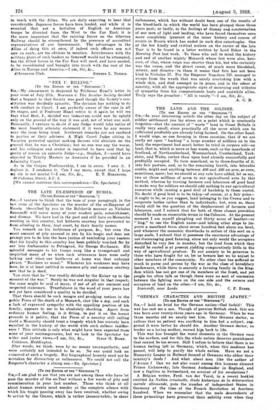THE LAND AND THE SOLDIER.
[To THE EDITOR or THE " SPECTATOR."]
Sra,—In your interesting article the other day on the subject of soldier settlement you lay stress on a point which is constantly forgotten—that the amount of " waste " land in Great Britain is really very small, since practically all the acres which can be cultivated profitably are already being farmed. On the other Land, I would urge, as one farming in three counties, that if we are really set upon " backing " a largo number of soldiers on to the land, the experiment had much better be tried in corpore rolli—on land, that is, which is more or less waste, such as the moorlands of Scotland, of Northumberland, Westmorland, Cumberland, York- shire, and Wales, rather than upon land already successfully and profitably occupied. To turn moorland, ns to three-fourths of it, into fair pasture, and, as to tho remaining fourth, into tolerable arable, might cost anything between £10 and 410 an acre, er even, eometimss, more; but we should at any rate have added, let us say, two or three millions of acres to our agricultural area by this method, whereas by turning farmers and labourers off good land to make way for soldiers we should add nothing to our agricultural resources while causing a good deal of hardship to those ousted. No doubt if good land is to be taken—of course, at a fair price—. it ought to be, as you suggest, land belonging to the Crown and to corporate bodies rather than to individuals; but, even so, there would still be the question of the displacement of farmers and labourers, and I submit that for both of these classes provision should be made on reasonable terms in the Colonies. At the present moment I am myself ploughing out thirty acres of heather—or " ling," to use the English name—and taking other steps to im- prove a moorland farm about seven hundred feet above sea level, end whatever the economic drawbacks to action of this sort on a large scale, I submit that it possesses the enormous advantage of not discouraging good farming, since not only would the occupiers disturbed be very few in number, but the land from which they would be ousted is at present yielding comparatively little in the way of agricultural produce. In our anxiety to be generous to those who have fought for us, let us beware lest we be unjust to other members of the community. No other class has quffered so much in purse and pereen by the war as the class of hereditary landowners, while there is scarcely a farming family in the king- dom which has not got one of its members at the front, and yet people too often talk as though there were no sort of connexion between the fighting men on the one side and the owners and occupiers of land on the other.—I am, Sir, &c.,


























 Previous page
Previous page